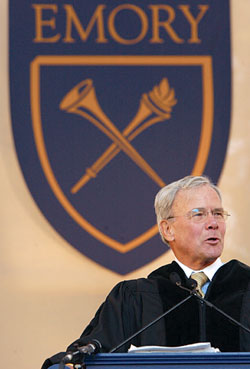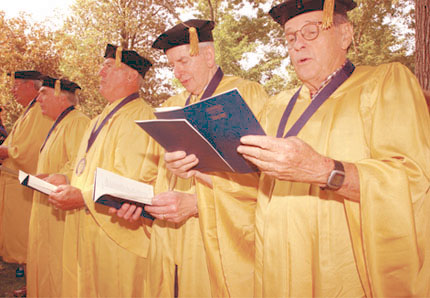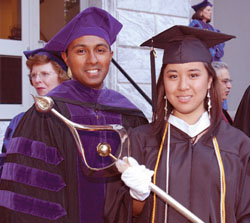Commencement 2005
A nightly news anchor and a British knight were among the dignitaries who took the stage at the University's 160th commencement on May 16, as the stately strains of the "Emory and Old St. Andrews March" accompanied the processional across the Quadrangle. The graduates quickly filled their seats, creating an undulating sea of black caps over scarlet, gold, purple, green, white, tan, and dark blue hoods, the hue signifying a particular field of study. Summer dresses and sneakers peeked out beneath formal black gowns.
Beach balls and bubbles soon were floating above the boisterous crowd, which quieted as Susan Henry Crowe 76T, dean of the chapel and of religious life, gave the invocation and praised the "impulse for life-giving curiosity" as graduates "leave this place of relative tranquility and security."
President James W. Wagner paid tribute to Emory's 3,423 graduates and their families, saying, "It's going to be a great day."
 He then introduced keynote speaker Tom Brokaw, who retired in December after twenty-eight years as anchor of the NBC Nightly News and has authored three books on the cohort of Americans born in the 1920s—"The Greatest Generation." He then introduced keynote speaker Tom Brokaw, who retired in December after twenty-eight years as anchor of the NBC Nightly News and has authored three books on the cohort of Americans born in the 1920s—"The Greatest Generation."
Brokaw's appearance, said Wagner, was a fitting tribute to the upcoming tenth anniversary of the reinstatement of Emory's journalism program, which was phased out in 1953 and revived in 1996.
"The name Tom Brokaw evokes for millions of Americans the virtue of integrity in news reporting. Such integrity is not easily achieved in these days when the credibility of journalism is undermined both from within and without," Wagner said. "By contrast, Mr. Brokaw represents what is right and good about journalism—the persistent digging for the facts, a tough-minded analysis of reality, the clear reporting of important stories, and the fair and unbiased presentation of a witness to our time."
Brokaw took the stage to robust applause, pausing to scan the crowd over top of his reading glasses.
"Thank you all very much, especially those of you who are graduating," he said in a deep, familiar voice. "But as a parent, let me say to those of you who are gathered around the perimeter of this felicitous setting—remember that today you're not just gaining a college graduate in your family, you're regaining a checking account."
Atlanta, he said, was one of the most important stops in his career as a young broadcast journalist, when he worked at WSB-TV on Peachtree Street.
"It was for me the beginning of a real education about the South," said Brokaw, a native of South Dakota. "I had to learn to say 'hey' not 'hi.' I had to learn to love biscuits and gravy and butterbeans with a little fatback. I especially learned to love chili dogs at The Varsity," he said. "But most of all I came to appreciate and love the many layers of this rich culture in the southeastern part of the United States and especially this city, because I was witness first hand to the defining moral struggle of our time: the struggle for civil rights. . . . The great courage that I saw then stays with me now."
Brokaw emphasized that "the world still requires everyday, personal, hands-on, be brave, speak out, individual courage," and urged graduates to keep in mind that there are "at this moment young men and young women in uniform in harm's way in far-off places who are dedicating their lives to your security."
The class of 2005—most of whom came to Emory in September of 2001—is unique, said Brokaw.
"You are the class of 9/11. You have the dizzying experience of entering college as your country was beginning a shooting war. As a clash of cultures and ideals was altering political and economic and spiritual landscapes far beyond these leafy environs," he said. "We cannot wish away the complex set of conditions that fuel a rage across a broad band of the globe."
Valuable lessons can be learned from another generation of young Americans, said Brokaw—those who fought in World War II, some of whom "are here today in their distinctive gold robes.
"They did not lay down their arms and say, as they could have, 'I've done my share.' Instead they came home and became immersed in their communities and their churches and their schools. They ran for political office, for mayor and for governor and for Congress and for the Senate and for the presidency. They formed service clubs and they never gave up on the idea of common cause and their role in it. . . . Remember them as you leave here. Remember how they rose as one to meet far greater challenges than we face today. Remember them as you put the mark of greatness on your generation."
Provost Earl Lewis presented Brokaw with the honorary Doctor of Humane Letters degree, saying that he has "fulfilled the Fourth Estate's noble purpose of guarding the public good . . . honored an entire generation, and deepened America's understanding of our shared past."
Four other honorary degree recipients were recognized:
Lord Robin Butler of Brockwell, head of University College at Oxford University, is perhaps best known in the United States as the lead author of the Butler Report, the investigative inquiry of England's political leadership and intelligence community before the start of the war against Iraq, a post to which he was appointed by Prime Minister Tony Blair. Over the span of his career, Butler served as private secretary to five prime ministers and at the highest levels of government in the British political system under both the Labour and Conservative parties. In 1988, he was knighted and appointed secretary of the Cabinet and head of the Home Civil Service, becoming Britain's highest-ranking civil servant.
Thomas G. Cousins, an Atlanta developer and chair of Cousins Properties Inc., was instrumental in saving the East Lake Golf Club, home course of legendary golfer Bobby Jones, as well as building the innovative, mixed-income East Lake community, which incorporates a charter school. Cousins, who graduated from the University of Georgia and served in the U.S. Air Force, developed such Atlanta landmarks as the CNN Center, the Omni Coliseum, and the Bank of America plaza. He has been a member of Emory's Board of Visitors and the Michael C. Carlos Museum, and was a member of the Board of Trustees for thirteen years. He continues to work on behalf of The Carter Center and chairs the Board of Trustees of the Bobby Jones Trust of Emory.
Sue T. Hegyvary 66N , professor and dean emeritus of the University of Washington School of Nursing, is an internationally recognized nursing scholar, educator, and researcher. She has a doctorate in sociology from Vanderbilt University, served as associate dean and associate vice president for nursing at Rush University in Chicago in the 1970s, and was elected as one of the first members of the American Academy of Nursing. She has done extensive consulting overseas on nursing practices and serves as editor of the Journal of Nursing Scholarship . She is a member of the Board of Fifty Visiting Committee for the Nell Hodgson Woodruff School of Nursing
Ben F. Johnson Jr. 36C 40L, a World War II Navy veteran, joined the Emory faculty in 1946 and served as dean of Emory Law School from 1961 to 1972. Johnson introduced programs that encouraged students to use their training in areas such as the environment and child welfare. The Emory Legal Service Center opened under his tenure and later became the Atlanta Legal Aid Society. He led the effort to desegregate private universities in Georgia in the 1960s, served as deputy attorney general for the state, and, as a state senator, was the principal author of the legislation that created MARTA. He was founding dean of the Georgia State University School of Law in the early 1980s. Johnson is the father of Ben F. Johnson III 65C, chair of Emory's Board of Trustees, who sat beside his father on the platform.
After conferring the honorary degrees and all major faculty and student awards, Johnson gave President Wagner the authorization to confer degrees, which he did to enthusiastic cheering from each section of the Quad. Teresa Rivero 85Ox 87C 93MPH , president of the Association of Emory Alumni, welcomed graduates into the AEA's ranks. "Each of you will bear the title of Emory alumna or alumnus for the rest of your lives," she said. "We are more than ninety thousand strong. We hope you will always feel at home here."

Oxford Commencement
Even in the twenty-first century, when technology and discoveries are moving at an astounding pace—from the Internet to the mapping of the human genome—Georgia's poet laureate, David Bottoms, told this year's 251 Oxford graduates to be confident that they can make their own unique and valuable mark on the future. "There is fascinating potential yet to be realized," said Bottoms, the John B. and Elena Diaz-Verson Amos Distinguished Chair in English Letters and associate dean of fine arts at Georgia State University, at Oxford College's May 14 commencement. "In the oddity of the endeavor usually lies its creative genius."
The founder of Five Points literary journal and recipient of the Walt Whitman Award from the Academy of American Poets, Bottoms "helps us find our way back to who we are and forward to who we might become," said Dean Dana Greene 71G, as she presented him with the Dean's Medal.
"The poet speaks with authority," she said. "His words stop us in our tracks and make us pay attention. He makes the ordinary extraordinary."
Dean for Campus Life Joseph Moon presented the Eady Sophomore Service Award to Alexandra Hope Vinson 05Ox (daughter of Arthur Vinson 66Ox 68C and sister of Jonathan Vinson 91Ox 99M ). Vinson is co-president of ROSA (Rainbow Oxford Student Alliance), president of the Oxford Chorale, president of the academic honor society Alpha Epsilon Upsilon, and founder of the Knitting Club—a group of faculty, staff, and students who donate assorted items to premature babies, homeless shelters, and a shelter for abused women.
The Emory Williams Award for Distinguished Teaching was presented by Dean of Academic Affairs Kent Linville to Associate Professor of Biology Steven Baker. Baker, who joined the Oxford faculty in 1990, teaches zoology, biology, anatomy and physiology, and freshwater ecology. Baker, also directs the Oxford Institute for Environmental Education, a summer continuing education program for teachers that encourages using schoolyard habitats and scientific investigation to teach ecological principles. —M.J.L.
Lucius Lamar McMullan Award As president of Emory's Student Government Association, Jimin Kim 05C oversaw a thirteen-person cabinet, a three-person staff, and a $1.7 million budget, and represented eleven thousand students.
 Kim's dedication, hard work, and careful stewardship did not go unnoticed by the University, which named her the 2005 Lucius Lamar McMullan Award recipient—$20,000, no strings attached. Kim's dedication, hard work, and careful stewardship did not go unnoticed by the University, which named her the 2005 Lucius Lamar McMullan Award recipient—$20,000, no strings attached.
"I was incredibly shocked to receive the McMullan Award," Kim said. "There are so many great people in my class. It's a tremendous honor and I am deeply humbled by it."
Kim served on the Atlanta Collegiate Council, an advisory board to Atlanta Mayor Shirley Franklin, and the campus life committee for the University's Board of Trustees. She was a member of Mortar Board, Omicron Delta Epsilon, and the John Gordon Stipe honor society.
As SGA president, Kim worked to develop Emory Pact, a proposed financial aid program. She helped push Emory to form a mental health task force, and negotiated an agreement among students, administrators, and Emory neighbors regarding outdoor concerts.
Kim, who gained her bachelor's degree in economics, plans to conduct research on the political and economic development of North Korea while teaching English in a public high school in South Korea as a Fulbright Fellow. "Right now, I want to direct my energy toward finding ways to facilitate peace on the Korean peninsula," says Kim, whose parents emigrated from South Korea to the United States in 1979. "The subject is where my passion lies and is very close to me."
Her goal is to study international law and develop a non-governmental organization to promote human rights and social justice, economic development, and education in East Asia.
"As long as I am an active citizen causing change," she says, "I know I will be happy."
Marion Luther Brittain Award Whether through his pro bono legal work, his weekly column in the student newspaper, or his efforts to make higher education more accessible for all, Bharath Parthasarathy 05L sought to address injustice and inspire compassion.
"We should all seize our privileged situation to . . . make a difference for others," Parthasarathy wrote in his final column for the Wheel. "Sure, advocating for change is difficult, fraught with setbacks and exhaustion. It can also be incredibly rewarding."
Described as a "model of the engaged student-scholar," Parthasarathy earned the highest student honor, the Marion Luther Brittain Award.
"More so than any student I have met, Bharath is tirelessly committed to making Emory a better school and a better place to live and learn," says law professor Michael Kang. "Bharath has been involved with nearly every student initiative to improve the law school. He is one of those people who makes his surroundings a better place by force of his personality and hard work."
Parthasarathy entered Emory law school after graduating with honors and highest distinction from the University of North Carolina at Chapel Hill in 2002. He volunteered as a caseworker for Student Legal Services, and worked as a research assistant with Common Cause of Georgia to improve governmental ethics laws. He served as a legislator and executive counsel to the Student Government Association, where one of his most notable accomplishments was his work with Emory Pact, a proposed financial aid program. He also completed an internship at The Carter Center, founded the Emory Law Young Democrats, and drafted daily legislative briefings during the 2005 Georgia General Assembly House Democratic Caucus.
Parthasarathy plans to join the Atlanta law firm of Alston and Bird, working in health care compliance and regulation. |